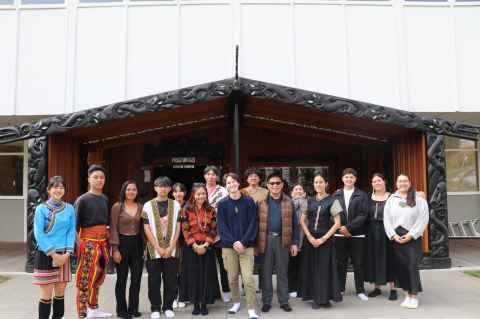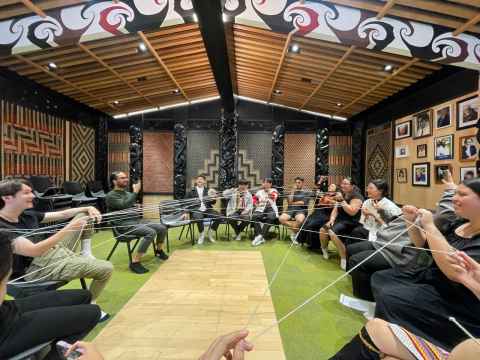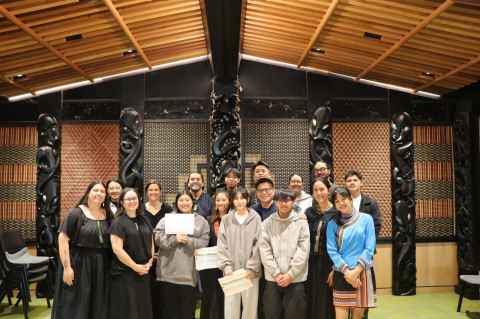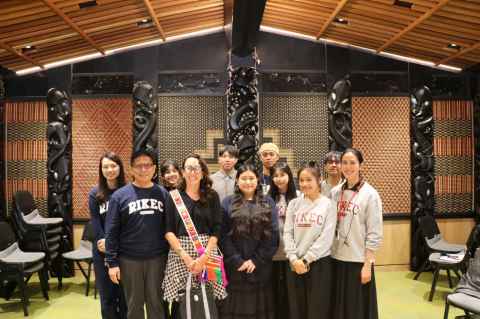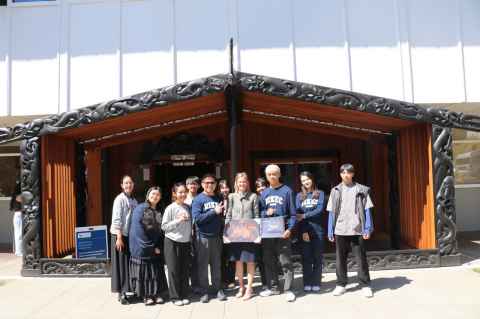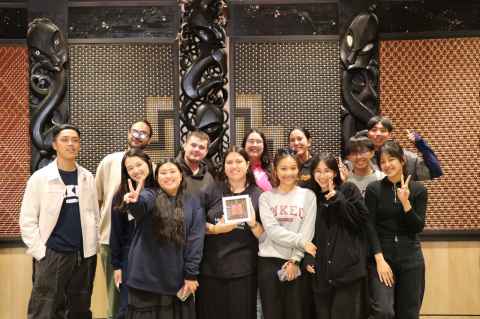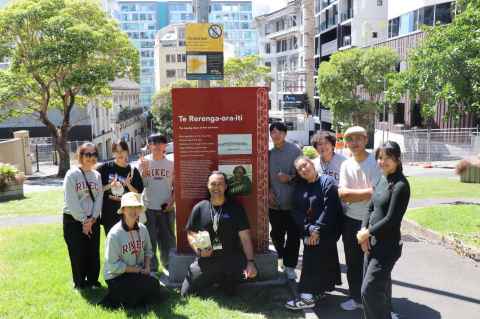Wānanga | Workshops
Te Wai Ariki regularly hosts wānanga on important, topical issues bringing together academics, iwi leaders, activists, affected communities, lawyers, judges, students, non-governmental organisations and other interested people.
Our wānanga provide the opportunity for Māori actors in a particular area to critically examine, coordinate and strategise with respect to legal and political avenues to further Indigenous peoples’ rights. They also provide an opportunity for our academics to deepen their research on particular kaupapa|subject matter
Our wānanga have been generously funded variously by Auckland Law School and Ngā Pae o te Maramatanga.
On this page:
2025 Wānanga | Workshops
December 2025
Indigenous–Settler Relations in Contemporary Legal and Political Philosophy
We are very proud to have co-hosted the workshop on Indigenous–Settler Relations in Contemporary Legal and Political Philosophy from 10-12 December 2025. We brought together an extraordinary number of respected academics from Aotearoa New Zealand and around the world, and including members of the highest echelons of the judiciary.
This workshop was hosted undera collaboration between the New Zealand Centre for Legal and Political Theory, Te Puna Rangahau o Te Wai Ariki | The Aotearoa New Zealand Centre for Indigenous Peoples and the Law, the Native Nations and Peoples Law Centre at the University of California, Los Angeles, Krushil Watene in Philosophy at the University of Auckland, and Kirsty Gover at the University of Melbourne.
The wānanga addressed topics as rich and diverse as legal pluralism, interlegality, constitutionalism, sovereignty, democratic theory, principles of accountability, environmental stewardship, and the evolving interface between Indigenous and state legal frameworks.
March 2025
Crossing into Shared Prosperity – Expanding Global Perspectives: Deepening Rikec-Aotearoa Connections
Awi Mona and Tracey Whare coordinated a workshop bringing together Indigenous law students from National Dong Hwa University in Taiwan, and Māori lecturers and students from Aotearoa New Zealand. Awi provided this reflection on the workshop:
As Indigenous legal practitioners, we carry a distinct social responsibility that goes beyond the mainstream conception of legal service: we serve as interlocutors between tribal cultures and national legal systems. Our role is not only that of legal practitioners but also of mediators—ensuring that the rights and perspectives of Indigenous communities are respected within the rule of law, and that the legal system itself evolves toward a more inclusive, pluralistic structure that supports harmonious coexistence. We wear the cultural regalia of our ancestors not merely as heritage but as a mission of service to our communities. At the same time, we equip ourselves with legal knowledge as a tool of empowerment—rooted in our tribal identities and oriented toward global engagement.
This international exchange and collaborative learning opportunity have enabled the participating students to contribute meaningfully to the revitalization of Indigenous rights in Taiwan. Furthermore, it has strengthened Indigenous university students' capacity to critically reflect on their own cultural identities and equipped them with the legal understanding necessary to actively participate in the development of Indigenous jurisprudence.
During this immersive engagement with Māori culture, education, history, and values, we extend our heartfelt gratitude to the Te Rākau Ture, Te Tai Haruru and Māori knowledge keepers at Auckland Law School. Despite our different cultural backgrounds, their generous and thoughtful sharing allowed us to experience the depth of Māori ancestral wisdom. This cultural exchange has significantly broadened our worldview, fostering a more diverse perspective through which we understand the world around us. More importantly, it has deepened our awareness of the cultural responsibility borne by Indigenous legal practitioners—to remain grounded in our land and communities, to become children of the tribe, and to embody a form of legal professionalism that is not only competent but also culturally courteous and ethically rooted.
2024 wānanga on decolonising settler states through institutional realisation of Indigenous peoples' rights
In December 2024, te Wai Ariki and the University of British Columbia hosted a workshop to explore the implementation of Indigenous peoples' rights around the world, especially under the United Nations Declaration on the Rights of Indigenous Peoples and focused in Canada, Scandinavia, Aotearoa New Zealand and Australia. The participants were Indigenous and non-Indigenous researchers and advocates from several disciplines and countries. They came together to build a shared collaborative understanding of the challenges faced and strategies employed to implement Indigenous peoples' rights, particularly in constitutional law. This workshop also helped work towards the future creation of a global Indigenous peoples' rights research hub.
2023 Wānanga mapping the movement for constitutional transformation
Te Wai Ariki brought together advocates from around Aotearoa|New Zealand for constitutional transformation to realise He Whakaputanga, te Tiriti o Waitangi and the United Nations Declaration on the Rights of Indigenous Peoples. Our participants included iwi leaders, major human rights NGOs, youth rōpū, lawyers and academics. Together we agreed a path to galvanise and coordinate our initiatives to realise transformation.
2021 Wānanga on tikanga Māori|Māori law approaches to redress for Māori abused in care
In June 2021, the Centre convened a wānanga, with support from Ngā Pae o te Māramatanga, to discuss a tikanga Māori based approach to redress for Māori abused in state or faith-based care to inform the mahi of the Royal Commission of Inquiry into Abuse in Care. Based on their kōrero at the wānanga, participants, who included ngā mōrehu Māori (Māori survivors) abused in care and Māori with professional expertise in areas connected to understanding and responding to that abuse, produced the report Te Ara Tākatu | Pathway Free from Harm.
The report contains strong recommendations to the Royal Commission on how to work with Māori survivors going forward and on how ‘redress’ for Māori survivors of abuse should be conceptualised and implemented.
The report was submitted to the Royal Commission of Inquiry into Abuse in Care as it considers its future direction and upcoming recommendations on redress.
Out of the wānanga the rōpū|group Te Ara Takatū was formed. Te Ara Takatū is a Māori survivor-led collective supporting and advocating for Māori survivors of abuse in state and faith-based care. Te Ara Takatū has offered critical feedback on the work of the Royal Commission and actively promotes Māori survivor-led responses to abuse in care. In 2023, members of Te Ara Takatū presented in the Forum Tent at Waitangi during the Waitangi Day celebrations to draw attention to these issues.
2021 Wānanga on tikanga Māori|Māori law and state law
A high-powered group of academics, lawyers, tauira and judges, including Supreme Court Justice Joe Williams, critically examined and questioned the increasing incorporation of tikanga Māori in the state legal system, especially in case law and in legislation.
2020 Wānanga on Māori rights to, and interests, in freshwater
Lawyers, iwi leaders, representatives of national Māori organisations and other advocates brainstormed legal and political avenues to realise Māori rights and interests in freshwater.
